Embark on a fascinating exploration of the Chihuahua, a breed that combines a charismatic personality with a petite stature – making it a unique addition to the canine world. Chihuahua are known for their ‘apple head’ shape and lively nature. The American Kennel Club (AKC) recognized them in 1904 and ranked them 34th out of 201 dog breeds. In 2022, The Kennel Club UK registered1,117 Long Coat & 1,337 Smooth Coat Chihuahuas, showing how popular they are.
Keep reading to know what makes Chihuahuas special and how to look after these adorable dogs.
The information provided herein is for informational purposes only. Please refer to ourdisclaimerfor more details..
Table of ContentsQuick FactsChihuahua Breed OverviewChihuahua HistoryChihuahua AppearanceChihuahua Size, Weight, and LifespanChihuahua Temperament & PersonalityChihuahua Children and Other PetsChihuahua Grooming & CareChihuahua Diet and NutritionChihuahua ExerciseChihuahua TrainingChihuahua HealthIdeal Owner for ChihuahuaHow To Get a ChihuahuaConclusion
Quick Facts
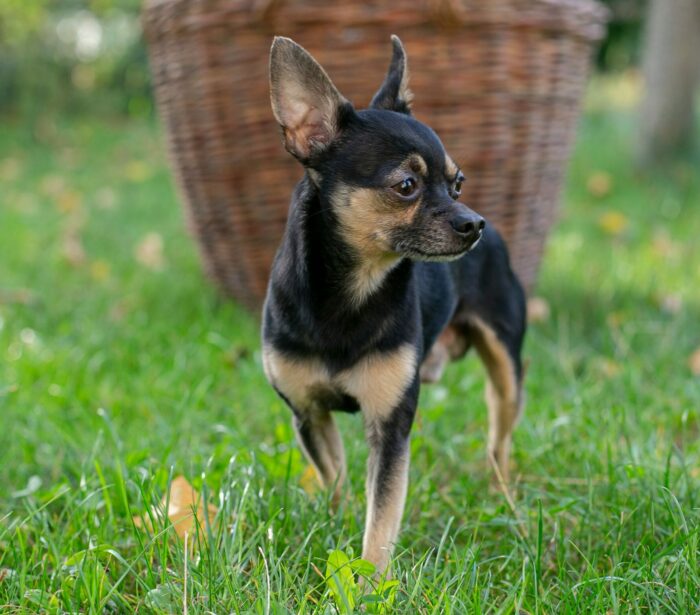
Image credits:Evie Fjord
SizeTinyWeight4 to 6 pounds (standard), up to 12 pounds (oversized)Height6 to 9 inchesLifespan14 to 16 yearsTypesThere are two kinds: Smooth Coat (short & smooth fur) and Long Coat (longer, wavier fur).FamiliesThey’re good for many homes – especially with older, calmer kids. Not the best for families with very young children because they’re so small.AppearanceThey have a unique ‘apple head’ or ‘deer head’ shape, big ears that stand up, and round eyes. And, they come in over 30 colors and patterns, like black, white, fawn, and chocolate.TemperamentAlert, protective, loyal, energetic, and playful.Other PetsUsually okay with other pets if they meet them early, but they might try to be the boss.TrainingThey’re smart and learn fast. Training with rewards works well.Exercise RequiredModerate – regular 20-30 minutes of exercise like walks and playful activities.Owner RequirementBest for adults or families with older kids. And they need someone who can spend a lot of time with them.GroomingSmooth coats need little grooming; long coats need regular brushing. Both types need care for their ears, eyes, nails & teeth.HealthProne to patellar luxation, hypoglycemia, heart disorders, collapsed trachea, seizures, hydrocephalus, dental issues & open fontanel.NutritionFood specially made for small breeds is good for them. It’s important to watch their weight.AccommodationThey can live in different places, like apartments or houses.CostBuying from breeders can cost $800 to $2,000 or more. While adoption fees are between $50 and $250.Kennel Club GroupToy (AKC classification)
SizeWeightTiny4 to 6 pounds (standard), up to 12 pounds (oversized)SizeHeightTiny6 to 9 inchesSizeLifespanTiny14 to 16 yearsSizeTypesTinyThere are two kinds: Smooth Coat (short & smooth fur) and Long Coat (longer, wavier fur).SizeFamiliesTinyThey’re good for many homes – especially with older, calmer kids. Not the best for families with very young children because they’re so small.SizeAppearanceTinyThey have a unique ‘apple head’ or ‘deer head’ shape, big ears that stand up, and round eyes. And, they come in over 30 colors and patterns, like black, white, fawn, and chocolate.SizeTemperamentTinyAlert, protective, loyal, energetic, and playful.SizeOther PetsTinyUsually okay with other pets if they meet them early, but they might try to be the boss.SizeTrainingTinyThey’re smart and learn fast. Training with rewards works well.SizeExercise RequiredTinyModerate – regular 20-30 minutes of exercise like walks and playful activities.SizeOwner RequirementTinyBest for adults or families with older kids. And they need someone who can spend a lot of time with them.SizeGroomingTinySmooth coats need little grooming; long coats need regular brushing. Both types need care for their ears, eyes, nails & teeth.SizeHealthTinyProne to patellar luxation, hypoglycemia, heart disorders, collapsed trachea, seizures, hydrocephalus, dental issues & open fontanel.SizeNutritionTinyFood specially made for small breeds is good for them. It’s important to watch their weight.SizeAccommodationTinyThey can live in different places, like apartments or houses.SizeCostTinyBuying from breeders can cost $800 to $2,000 or more. While adoption fees are between $50 and $250.SizeKennel Club GroupTinyToy (AKC classification)
SizeWeightTiny4 to 6 pounds (standard), up to 12 pounds (oversized)
SizeWeight
Size
Weight
Tiny4 to 6 pounds (standard), up to 12 pounds (oversized)
Tiny
4 to 6 pounds (standard), up to 12 pounds (oversized)
SizeHeightTiny6 to 9 inches
SizeHeight
Height
Tiny6 to 9 inches
6 to 9 inches
SizeLifespanTiny14 to 16 years
SizeLifespan
Lifespan
Tiny14 to 16 years
14 to 16 years
SizeTypesTinyThere are two kinds: Smooth Coat (short & smooth fur) and Long Coat (longer, wavier fur).
SizeTypes
Types
TinyThere are two kinds: Smooth Coat (short & smooth fur) and Long Coat (longer, wavier fur).
There are two kinds: Smooth Coat (short & smooth fur) and Long Coat (longer, wavier fur).
SizeFamiliesTinyThey’re good for many homes – especially with older, calmer kids. Not the best for families with very young children because they’re so small.
SizeFamilies
Families
TinyThey’re good for many homes – especially with older, calmer kids. Not the best for families with very young children because they’re so small.
They’re good for many homes – especially with older, calmer kids. Not the best for families with very young children because they’re so small.
SizeAppearanceTinyThey have a unique ‘apple head’ or ‘deer head’ shape, big ears that stand up, and round eyes. And, they come in over 30 colors and patterns, like black, white, fawn, and chocolate.
SizeAppearance
Appearance
TinyThey have a unique ‘apple head’ or ‘deer head’ shape, big ears that stand up, and round eyes. And, they come in over 30 colors and patterns, like black, white, fawn, and chocolate.
They have a unique ‘apple head’ or ‘deer head’ shape, big ears that stand up, and round eyes. And, they come in over 30 colors and patterns, like black, white, fawn, and chocolate.
SizeTemperamentTinyAlert, protective, loyal, energetic, and playful.
SizeTemperament
Temperament
TinyAlert, protective, loyal, energetic, and playful.
Alert, protective, loyal, energetic, and playful.
SizeOther PetsTinyUsually okay with other pets if they meet them early, but they might try to be the boss.
SizeOther Pets
Other Pets
TinyUsually okay with other pets if they meet them early, but they might try to be the boss.
Usually okay with other pets if they meet them early, but they might try to be the boss.
SizeTrainingTinyThey’re smart and learn fast. Training with rewards works well.
SizeTraining
Training
TinyThey’re smart and learn fast. Training with rewards works well.
They’re smart and learn fast. Training with rewards works well.
SizeExercise RequiredTinyModerate – regular 20-30 minutes of exercise like walks and playful activities.
SizeExercise Required
Exercise Required
TinyModerate – regular 20-30 minutes of exercise like walks and playful activities.
Moderate – regular 20-30 minutes of exercise like walks and playful activities.
SizeOwner RequirementTinyBest for adults or families with older kids. And they need someone who can spend a lot of time with them.
SizeOwner Requirement
Owner Requirement
TinyBest for adults or families with older kids. And they need someone who can spend a lot of time with them.
Best for adults or families with older kids. And they need someone who can spend a lot of time with them.
SizeGroomingTinySmooth coats need little grooming; long coats need regular brushing. Both types need care for their ears, eyes, nails & teeth.
SizeGrooming
Grooming
TinySmooth coats need little grooming; long coats need regular brushing. Both types need care for their ears, eyes, nails & teeth.
Smooth coats need little grooming; long coats need regular brushing. Both types need care for their ears, eyes, nails & teeth.
SizeHealthTinyProne to patellar luxation, hypoglycemia, heart disorders, collapsed trachea, seizures, hydrocephalus, dental issues & open fontanel.
SizeHealth
Health
TinyProne to patellar luxation, hypoglycemia, heart disorders, collapsed trachea, seizures, hydrocephalus, dental issues & open fontanel.
Prone to patellar luxation, hypoglycemia, heart disorders, collapsed trachea, seizures, hydrocephalus, dental issues & open fontanel.
SizeNutritionTinyFood specially made for small breeds is good for them. It’s important to watch their weight.
SizeNutrition
Nutrition
TinyFood specially made for small breeds is good for them. It’s important to watch their weight.
Food specially made for small breeds is good for them. It’s important to watch their weight.
SizeAccommodationTinyThey can live in different places, like apartments or houses.
SizeAccommodation
Accommodation
TinyThey can live in different places, like apartments or houses.
They can live in different places, like apartments or houses.
SizeCostTinyBuying from breeders can cost $800 to $2,000 or more. While adoption fees are between $50 and $250.
SizeCost
Cost
TinyBuying from breeders can cost $800 to $2,000 or more. While adoption fees are between $50 and $250.
Buying from breeders can cost $800 to $2,000 or more. While adoption fees are between $50 and $250.
SizeKennel Club GroupTinyToy (AKC classification)
SizeKennel Club Group
Kennel Club Group
TinyToy (AKC classification)
Toy (AKC classification)
Chihuahua Breed Overview
The Chihuahua, a tiny dog but spirited toy breed, is renowned for its large personality encapsulated inthe world’s smallest canineform. They’re really loyal and loving to their owners – making them great pets for different types of homes. They can live happily anywhere, from a first-time pet owner’s place to a busy family home. And despite their size, Chihuahuas are active and playful. Because of their size, you have to be careful around them, especially with kids, to avoid hurting them. They come in two types:
They can be black, brown, white, tan & other color mixes. Chihuahuas are intelligent, quick learners, excelling in agility and obedience with proper, positive reinforcement training. They’re curious and brave, often getting very close to one person. And you have to watch them carefully because they’re so small, especially when they’re in new places or around bigger dogs.
Chihuahua History
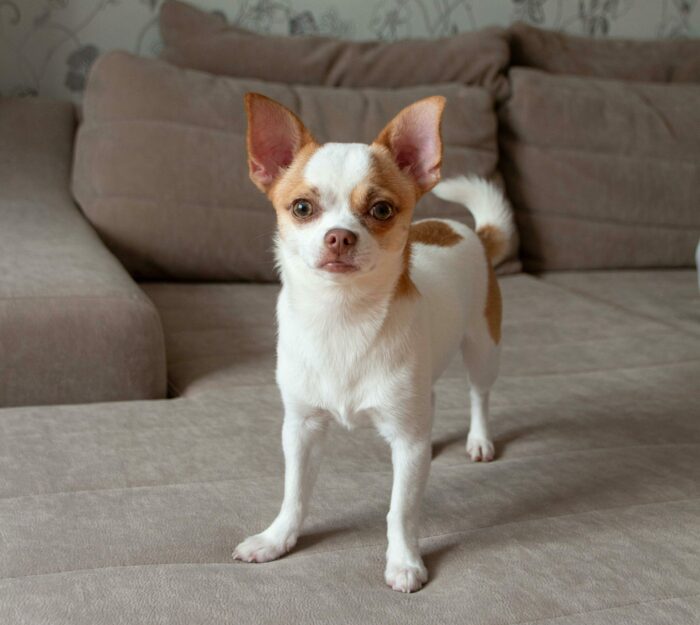
The Chihuahua’s history is as intriguing as its personality. No one knows exactly where they came from, but there are two main ideas.
What’s undisputed is that the modern Chihuahua was first recognized in the 1850s in the Mexican state of Chihuahua, which lent its name to the breed. The AKC recognized the breed in 1904, with a dog named Midget being the first registered Chihuahua.
Chihuahua Appearance
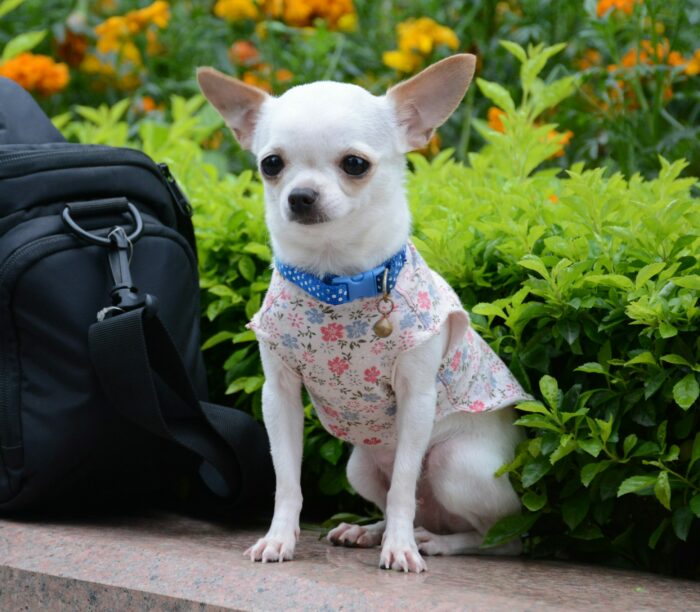
Image credits:thanh hien
Chihuahua Size, Weight, and Lifespan
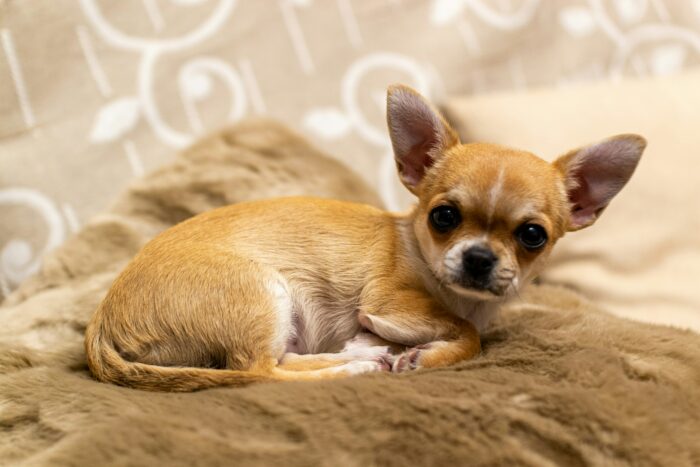
Image credits:David Vives
The Chihuahua packs a lot of personality into its small frame despite their small size. Here’s a quick overview of its size, weight & lifespan:
Chihuahua Temperament & Personality
The Chihuahua might be tiny, but it’s full of charm, confidence, and a little bit of feisty spirit. Let’s look at their personality:
Chihuahua Children and Other Pets
Chihuahuas can be great friends for kids and live well with other pets if they meet the right way. But because they’re so small, you have to be careful:
Chihuahua Grooming & Care
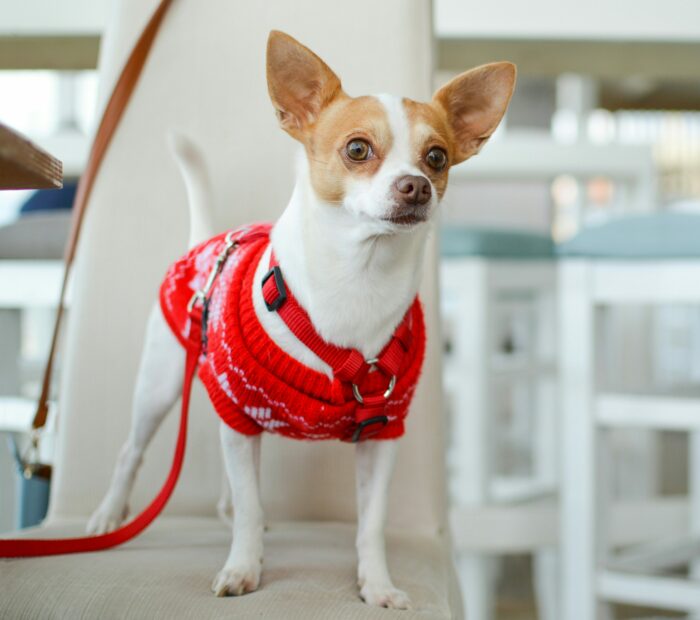
Image credits:Tamara Bellis
Taking care of a Chihuahua isn’t too hard, and it helps keep these cute dogs happy and healthy:
Chihuahua Diet and Nutrition
As chihuahuas are small dogs, so they need a special diet to stay healthy:
Feeding them twice a day, based on the recommended portion of the food package, is best.
Chihuahua Exercise
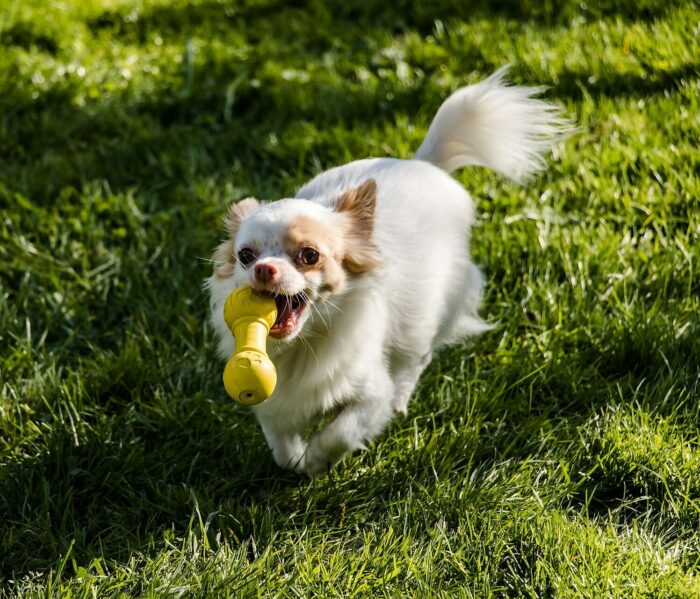
Image credits:Myriams-Fotos
Even though Chihuahuas are tiny, they have a lot of energy. Like all dogs, these dogs need about 20-30 minutes of exercise each day, and they love to:
But it’s important to watch how much they do so they don’t get too tired, especially when it’s hot.
For puppies, short times of playing are good until they’re about three months old. Then, you can slowly increase their exercise but not too much. When they’re around four months old, – start taking them for walks. And use a harness to keep their back and neck safe. But don’t make them run long distances.
Remember: Chihuahuas are indoor pets; their small size makes them vulnerable to predators and larger animals outdoors.
Chihuahua Training
Training a Chihuahua is about helping them get along with others and learning good manners. They’re smart but can be a bit cheeky, so start your dog training early and keeping it up is important:
Chihuahua Health
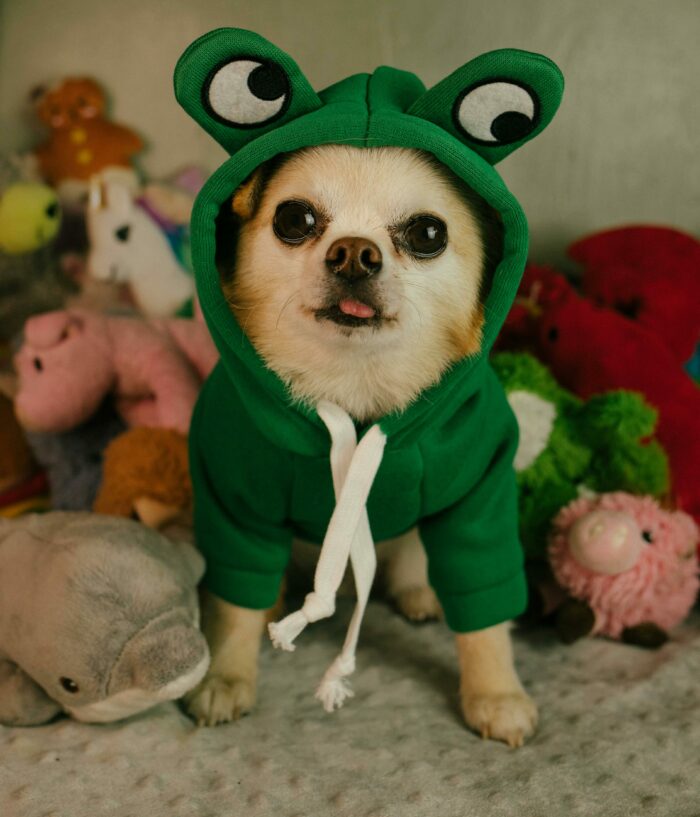
Image credits:Ellie Burgin
Chihuahuas are usually healthy, but they can have some health problems. Knowing about these early helps keep them well:
Quick help, like putting honey under their tongue and seeing a vet, is important.
Ideal Owner for Chihuahua
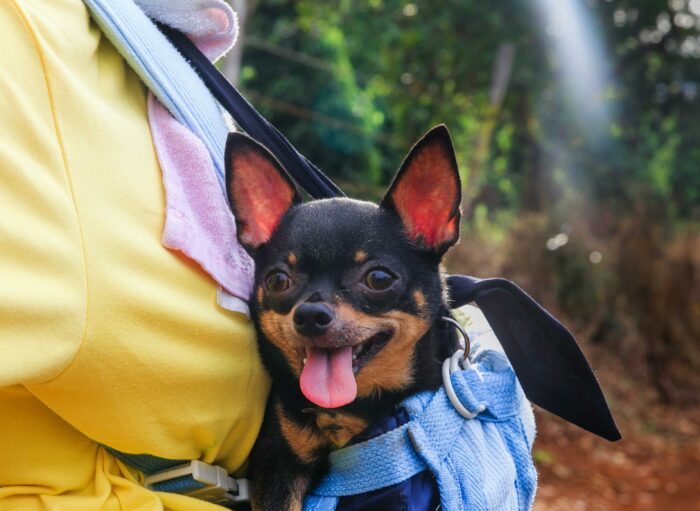
Image credits:Quang Nguyen Vinh
Thinking about getting a Chihuahua? It’s important to look at your home and how you live. These little dogs with medium energy do well in different places – like:
These breeds are usually better for adults or families with older kids because they’re small & can be strong-willed. Young children might accidentally harm them. And larger pets could unintentionally injure these petite companions. The best owners are those who can give them a safe, loving, and caring home.
How To Get a Chihuahua
If you want to bring a Chihuahua puppy home, you have two main choices: buy from a good breeder or adopt an adult dog from a rescue group.
Adoption fees change based on things like the dog’s age, health, and the care they got before being adopted. Usually costing between $50 and $250.
Both ways can help you find a healthy, loving Chihuahua friend.
Conclusion
Enjoy your time with a Chihuahua; it’s sure to be a rewarding experience and full of joy!
621views621views
Pet Wellness